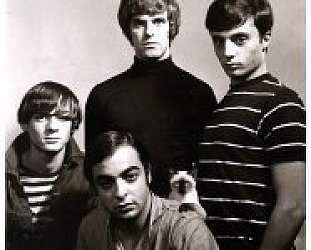Graham Reid | | 1 min read
Jonas Kullhammar Quartet: Julaftonsfan (extract only)

I cannot tell a lie, I bought this for the cover when I spotted it in a record store in the old town of Stockholm . . . but am delighted I did.
At the time I didn't even know it was a jazz album, let alone one by a guy who has won a stack of awards in Sweden and been nominated for Swedish Grammys.
I had not previously heard of tenor player Jonas Kullhammar or his quartet however the liner notes with this record (yep, it's vinyl) say this is their seventh album together (or 15th if you count the eight-CD set they released in 2009!)
Kullhammer also notes he has appeared on 150 albums but that in July 2009 he took a break which turned into the worst year of his life. The music on this album represents that year of going down then coming back up again. It is also, he says, to be the final recording with this quartet (which perhaps explains the cover art).
That's the backstory, but the most interesting thing is just how vibrant and alive this album feels.
It is mostly vigorous bop with nods to classic Coltrane, but on the furiously angular Allting Kan Ga Itu, Kullhammar -- propelled by the drumming of Jonas Holgersson -- starts getting way out there in a manner akin to Archie Shepp, swooping and squirreling down into some commanding free playing before pulling it all back together, then letting pianist Torbjorn Gulz deconstruct the thing again.
KBT is an equally muscular piece where Kullhamar seems to wrestle the melodic lines out from within.
Domadagen however is a much more stately and considered piece as Kullhammer stretches notes over a gently pounding substructure from Holgersson and bassist Torbjorn Zetterberg, who gets in some lovely arco work also.
The quartet is joined by a number of guests (including Kullhammar's father who is a drummer) on the fiery title track which translates to somethng like Let It Be. But this isn't their take on that Beatles' tune, rather a bouncy almost West African-influenced piece of the kind you imagine Don Cherry might have felt at home on (and certainly Bengt Berger who pulled Scandinavian and African musicians together with Cherry for the Bitter Funeral Beer album on ECM in '82).
If this a personal journey for Kullhammar as he says, he must feel vindicated that after such a tough year he could produce something this vital.
Very glad I saw this cover, burst out laughing and found the shop again two days later when I had some money on me.
Kullhammar seems little known outside of those northern climes, but he makes very good sense even this far away from his homeland.
Jonas Kullhammar runs his own label and you can investigate his catalogue and that of others on the label here. And this is his homepage.





post a comment